Veneers vs Crowns: Which Is Better?
Are you searching for the best dental restoration method to achieve a beautiful smile and tooth function? Then you must consider two popular cosmetic dental services: Veneers vs crowns. Both alternatives are similar in looks but serve different purposes. There are some key differences between them, which is why you must be careful in choosing the right option that addresses your specific dental condition. To help you find veneers or crowns which is the best option for you, here is a guide that gives all the information that you must need to know about both options before planning your treatment with your dentist.
What are Veneers and Crowns?
Dental veneers are usually wafer-thin (about 1mm thick), stain-resistant, tooth-colored porcelain-based shells that are custom designed to be bonded over the front surface of your teeth. Another type available is composite-resin veneers. They are strong but brittle and are used mainly for cosmetic purposes, that help to change the size, shape, color, or length of the imperfect teeth.
In contrast, a dental crown also referred to as a tooth-shaped cap, is a metal, porcelain, or combination-based dental prosthesis that encases the entire visible portion of the tooth. The capping of the tooth help restores its size, strength, and shape, and improves its appearance.
How Do You Know Which Option Would Be Best for You?
After learning about veneers and crowns, and still not able to choose which is better to get crowns or veneers, then take a look at their differences based on the below-mentioned variables.
Longevity and Their Placement
Veneers vs crowns, which lasts longer? Generally, if you make a comparison between either dental restoration option, their average life expectancy is about the same. It depends upon how they are cared for and maintained by you. Just like your natural teeth, if you brush daily and floss around those teeth, and do not grind your teeth while sleeping, then you can easily enjoy the benefits for 7-10 years before they require an update.
However, teeth veneers are thin shells that can easily be dislodged or cracked by sharp or repeated impacts. They are placed after little or no removal of portions of tooth enamel and need to be replaced frequently after a few years. As they require little tooth preparation, more naturally healthy teeth remain intact, hence making it a more conservative option.
On the flip side, crowns are much thicker than veneers (about 2mm), hence making them more durable and crack-resistant than veneers. They can last for most of your life. Their placement involves a lot of trimming i.e. about 2-4 times of tooth reduction as that of veneers.
Veneers vs Crown: Usage
Veneers are mostly used to fix minor tooth imperfections like discolored teeth caused by root canal therapy, excessive fluoride treatments, or certain drug usage. However, they can even be used for chipped, broken, worn down, misaligned teeth, or gaps between the teeth. In the long run, they tend to be more aesthetically pleasing as they show less gum margin but need a quick replacement.
On the other hand, a crown is used to support a tooth with a large filling or protect a weak tooth from decay. It can even be used to secure a dental bridge in its place, as a replacement tooth for a dental implant, or to cover badly stained or misshapen teeth. Furthermore, if you have severely worn down teeth or discolored teeth, or a large missing portion of teeth, you can opt for a crown.
Veneers vs Crowns: Safety
Are veneers safer than crowns? Porcelain veneers are safe to use as they are biocompatible, hence they have no chance of causing an allergic reaction. Moreover, they are placed with the help of special bonding agents which are also safe for your teeth and overall health. They do not get stained easily and are extremely resistant to damage.
Contrarily, teeth crowns’ safety depends upon the material of which they are composed. Usually, porcelain, gold, or composite resin-based crowns pose no risk with MRI but an all-metal or porcelain-fused metal could lead to problems. It is extremely rare but possible to have an allergic reaction to metallic crowns. If your underlying tooth becomes decayed or the cementing material of the crown gets loose, then crowns may loosen and fall off from their place.
Affordability
Which is the cheaper option: veneers or crowns? The individual costs of veneers and crowns may vary depending upon the size of your tooth, its location inside your mouth, and the material used for its fabrication. Porcelain veneers are usually cheaper than crowns as the latter provides a more complete and permanent solution. Moreover, the ceramic and porcelain crowns are slightly costlier than their all-metal counterparts. As veneers are used for aesthetic purposes their cost is not covered under your dental insurance policy. However, the cost of crowns can be claimed through insurance.
Whichever is your treatment option, our dentist at First Point Dental will provide you with a personalized payment plan to make such dental services pocket-friendly for you. To learn more consult with the best dental experts at First Point Dental at 888-736-6430.

